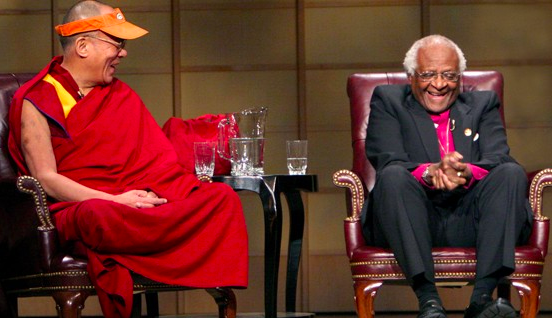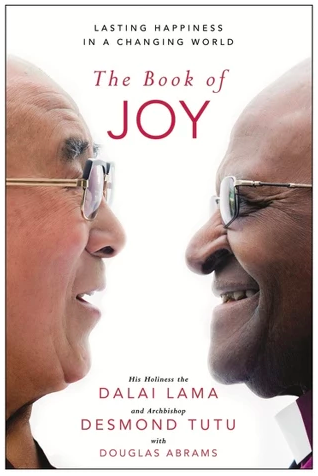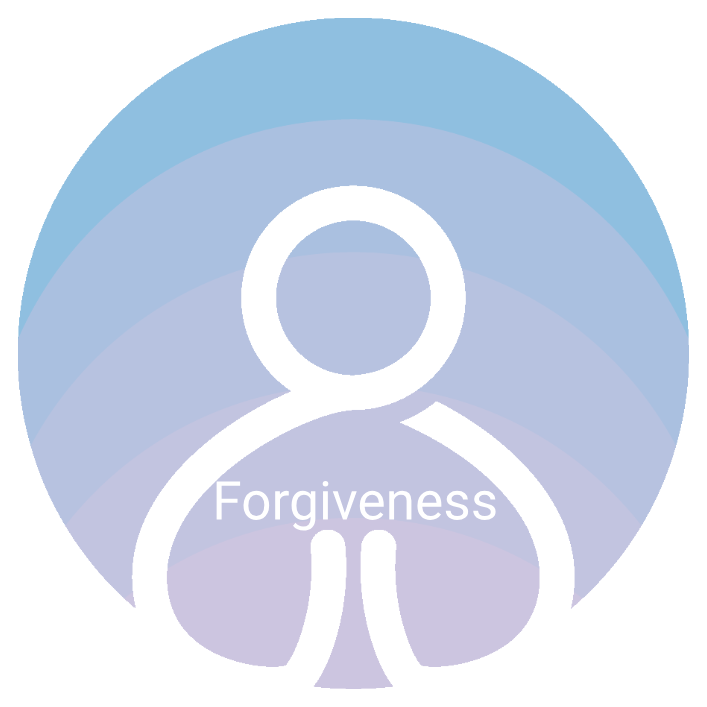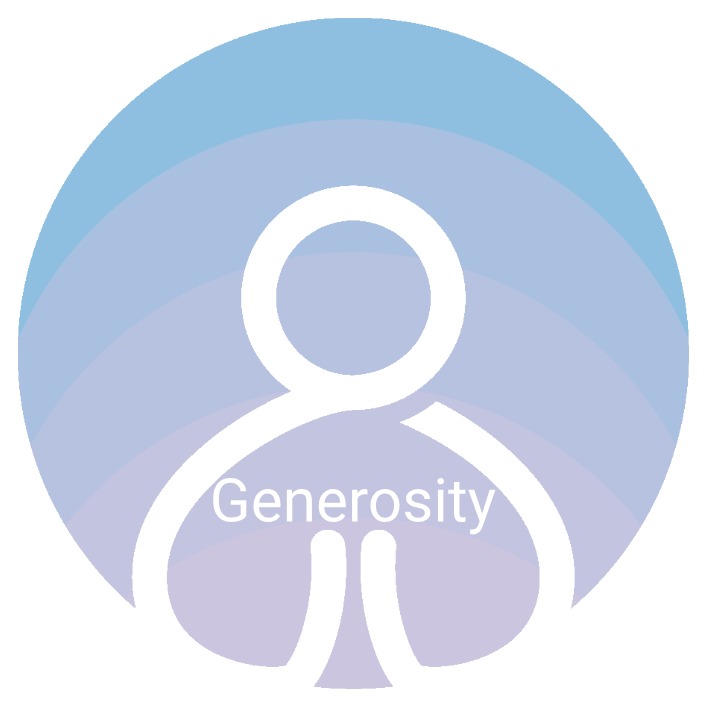“We are fragile creatures,” Archbishop Desmond Tutu states in The Book of Joy: Lasting Happiness in a Changing World (2016), author Douglas Abrams’ narrated account of a week spent interviewing the Dalai Lama and Archbishop Desmond Tutu. “And it is from this weakness, not despite it, that we discover the possibility of true joy.”
In an era that equates strength of character and a drive for perfection with happiness and success, it can be challenging to consider how joy can come from acknowledging our weakness, limitations and fragility. Yet this is precisely what Archbishop Desmond Tutu and the Dalai Lama suggest, arguing that joy – the true, lasting kind – comes from cultivating qualities of the mind and heart that are wholly independent from our external circumstances.
In fact, it is not that these qualities cure us of our trials and suffering, but rather equip us to endure them with grace and acceptance through a repositioning of our inner framework. Author Douglas Abrams writes:
“Discovering more joy does not, I’m sorry to say, save us from the inevitability of hardship and heartbreak. In fact, we may cry more easily, but we will laugh more easily, too. Perhaps we are just more alive. Yet as we discover more joy, we can face suffering in a way that ennobles rather than embitters. We have hardship without becoming hard. We have heartbreak without being broken.”
While we have already examined the four qualities of the mind – perspective, humility, humor and acceptance – below we’ll look at the four “qualities of the heart” – forgiveness, gratitude, compassion and generosity – that Archbishop Tutu and the Dalai Lama offer for navigating life’s inevitable suffering and unlocking the lasting happiness we so often long for.
1. Forgiveness
Forgiveness frees us from the past:
“Forgiveness is the only way to heal ourselves and to be free from the past. Without forgiveness, we remain tethered to the person who harmed us. We are bound to the chains of bitterness, tied together, trapped. Until we can forgive the person who harmed us, that person will hold the keys to our happiness, that person will be our jailor. When we forgive, we take back control of our own fate and our feelings. We become our own liberator.” –Archbishop
There is an important distinction between forgiveness and allowing others’ wrongdoing:
“Sometimes people misunderstand and think forgiveness means you accept or approve of wrongdoing. No, this is not the case. We must make an important distinction. The actor and the action, or the person and what he has done. Where the wrong action is concerned, it maybe necessary to take appropriate counteraction to stop it. Toward the actor, or the person, however, you can choose to develop anger and hatred. This is where the power of forgiveness lies – not losing sight of the humanity of the person while responding to the wrong with clarity and firmness.” –Dalai Lama
Contrary to certain beliefs, forgiveness isn’t a sign of weakness:
“The natural response when someone hits you is wanting to hit back. But why do we admire people who don’t choose revenge? It is our recognition of the fact that, yes, there are those who think an eye for an eye is going to satisfy you. But in the end you discover that an eye for an eye will leave the whole world blind. We have an instinct for revenge but also for forgiveness.” –Archbishop
Widening our perspective can aid our forgiveness:
“There are certain people who act out of the animal mind. When someone hits them, they want to hit back, retaliate. With our human brain, we can think, if I hit back, what use will it be in the short-term or in the long-term? We can also realize that obviously nobody was born cruel, to harm us, but because of certain circumstances, now he or she dislikes me, so hits me. So I was also involved. Who is to blame? So sitting and thinking of the different causes and conditions, then you see that if we are really angry we must be angry toward the causes and conditions – ultimately their anger, their ignorance, their short-sightedness, their narrow-mindedness. So that brings a sense of concern, and we can feel sorry for these people.” –Dalai Lama
Ultimately, forgiveness is something we must choose:
“Forgiveness does not mean we forget. You should remember the negative thing, but because there is a possibility to develop hatred, we mustn’t allow ourselves to be led in that direction – we choose forgiveness.” –Dalai Lama
2. Gratitude
“Every day, think as you wake up, ‘I am fortunate to be alive. I have a precious human life. I am not going to waste it.’” –Dalai Lama
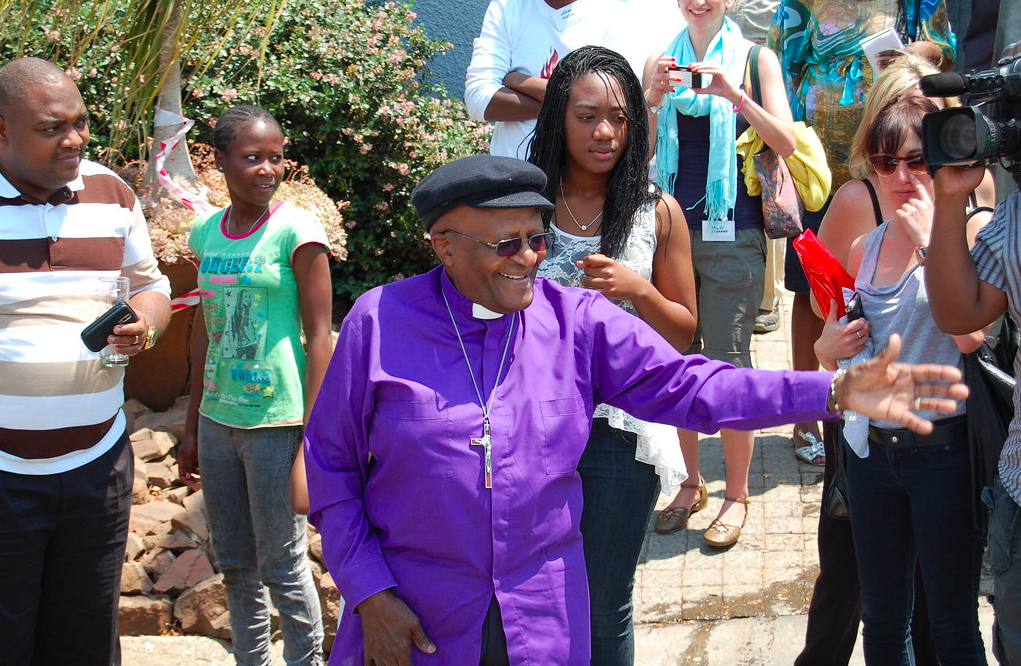
It really does help to count our blessings:
“You can be helped to look at the world an see a different perspective. Where some people see a half-empty cup, you can see it as half-full. Perhaps people will be moved to see that there are very, very, very many people in the world today who will not have had the kind of breakfast that you had. Many, many millions in the world today are hungry. It’s not your fault, but you woke up from a warm bed, you were able to have a shower, you put on clean clothes, and you were in a home that is warm in the winter. Now just think of the many who are refugees who wake up in the morning, and there’s not very much protection for them against the rain that is pelting down. Perhaps there is no warmth or food or even just water. It is to say in a way, yes, it is to say really, you do want to count your blessings.” –Archbishop
Gratitude helps shift our perspective:
“Gratitude is the recognition of all that holds us in the web of life and all that has made it possible to have the life that we have and the moment that we are experiencing. Thanksgiving is a natural response to life and may be the only way to savor it. Both Christian and Buddhist traditions, perhaps all spiritual traditions, recognize the importance of gratefulness. It allows us to shift our perspective, as the Dalai Lama and the Archbishop counseled, toward all we have been given and all that we have. It moves us away from the narrow-minded focus on fault and lack and to the wider perspective of benefit and abundance.” –Author Douglas Abrams
And gratitude helps ground us in the present:
“Impermanence, the Dalai Lama reminds us, the nature of life. All things are slipping away, and there isa real danger of wasting our precious human life. Gratitude helps us catalog, celebrate, and rejoice in each day and each moment before they slip through the vanishing hourglass of experience.” –Author Douglas Abrams
3. Compassion
“Too much self-centered thinking is the source of suffering. A compassionate concern for others’ well-being is the source of happiness.” –Dalai Lama
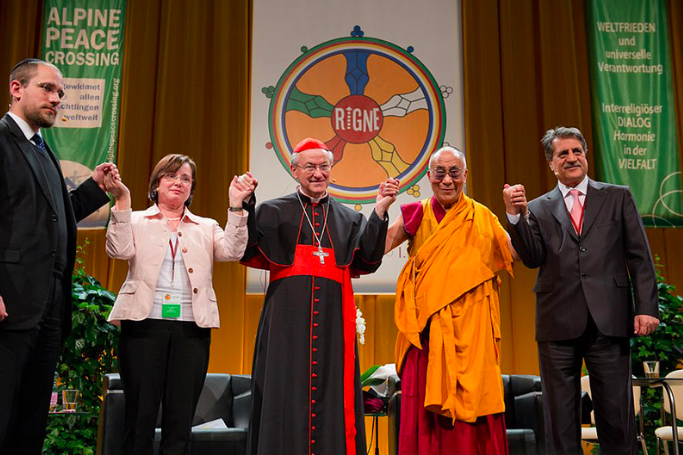
What is compassion, really?
“Compassion is a sense of concern that arises when we are confronted with another’s suffering and feel motivated to see that suffering relieved. Compassion is what connects the feeling of empathy to acts of kindness, generosity, and other expressions of altruistic tendencies.” –Jinpa, quoted in The Book of Joy
Compassion is part of our human nature:
“…we are social animals. Even for kings and queens or spiritual leaders, their survival depends on the rest of the community. So therefore, if you want a happy life and fewer problems, you have to develop a serious concern for the well-being of others.” –Dalai Lama
Compassion can actually help alleviate our own suffering:
“This concern for others is something very precious. We humans have a special brain, but this brain causes a lot of suffering because it is always thinking me, me, me, me. The more time you spend thinking about yourself, the more suffering you will experience. The incredible thing is that when we think of alleviating other people’s suffering, our own suffering is reduced. This is the true secret to happiness. So this is a very practical thing. In fact, it is common sense.” –Dalai Lama
In other words…
“When you say, ‘I, I, I,I, I,’ as His Holiness pointed out, you are going to come a cropper. But when you say, ‘How can I help?’ even in the midst of your deep anguish, it’s got an alchemy that transforms your pain. It may not take it away. But it becomes in away bearable, more than it was at the time when you were just saying, ‘poor me,’ thinking only about yourself.” –Archbishop
You can put it into practice quite easily:
“Try out being kind when you are walking in the street and say good morning to the people you are passing, or smile, when you are not feeling like it. I bet you my bottom dollar, in a very short period of time this pall of self-regard, which is a bad self-regard, lifts. It’s universal. When you try it out, why does it work? We really are wired to be caring of the other. And when we go against that fundamental law of our being, whether we like it or not, it is going to have deleterious consequences for us.” –Archbishop
Why, then, does compassion seem to be lacking in our world?
“Our human nature has been distorted. I mean, we are actually quite remarkable creatures…[a]nd even the cynic will have to admit that…[w]e’re wired to be other-regarding. We shrivel if there is no other. It’s really a glorious thing. When you say, ‘I will care for only me,’ in an extraordinary way that me shrivels and gets smaller and smaller. And you find satisfaction and joy increasingly elusive. Then you want to grab and try this and try that, but in the end you don’t find satisfaction.” –Archbishop
Ultimately, the reality is that:
“We are most joyful when we focus on others, not on ourselves.” –Author Douglas Abrams
4. Generosity
A way of being in the world to work toward: “becoming an oasis of peace, a pool of serenity that ripples out to all of those around us.” –Archbishop
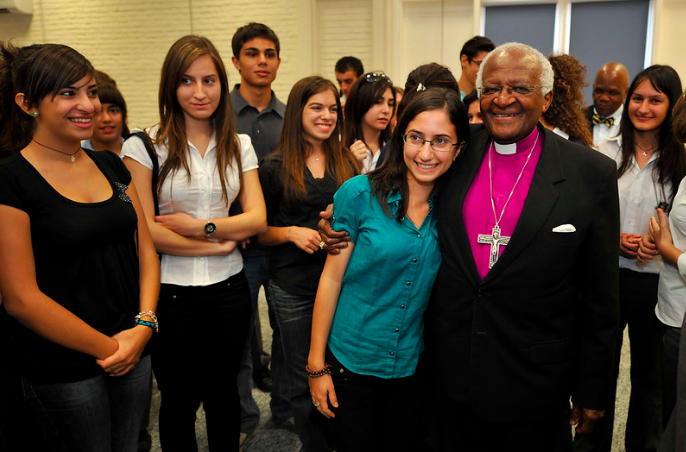
The saying is true! In giving, we really do receive:
“I’ve always joked and said God doesn’t know very much math, because when you give to others, it should be that you are subtracting from yourself. But in this incredible kind of way – I’ve certainly found that to be the case so many times – you gave and it then seems like in fact you are making space for more to be given to you.” –Archbishop
We can give of ourselves by caring for others:
“The people we admire are those who have been other-regarding. Who even in the midst of a lot of hard work and so on, when you speak with them, they have a way of making you feel that, at that precise moment, you are the most important thing they have to deal with.” –Archbishop
This isn’t just a spiritual reality:
“Many Japanese companies are very successful because of the relationship between the employee and the employer. The employees have the feeling that ‘this is my company.’ So they work whole-heartedly. So with the employer that just cares about the profits, the employees will always be thinking about the lunch break or the teatime, never thinking about the company. If you build the real concept of working together, and the profit is shared together, then real harmony develops. This is what we really need now. Harmony among the seven billion human beings.” –Dalai Lama
Our modern world has ‘distorted’ our innate sense of compassion and generosity:
“We have been brought up to think that we have to obey the laws of the jungle. Eat or be eaten. We are ruthless in our competitiveness. So much so that now stomach ulcers are status symbols. They show just how very hard we work. We work hard not only to supply our needs and the needs of our families, but we are trying to outdo the other. We have downplayed the fact that actually our created nature is that we are made for a complementarity. We have become dehumanized and debased. As Martin Luther King Jr., said, ‘We must learn to live together as sisters and brothers, or we will perish together as fools.” –Archbishop
But a generosity of spirit actually facilitates the practice of all the other pillars of joy:
“When we practice a generosity of spirit, we are in many ways practicing all the other pillars of joy. In generosity, there is a wider perspective, in which we see our connection to all others. There is a humility that recognizes our place in the world and acknowledges that at another time we could be the one in need, whether that need is material, emotional or spiritual. There is a sense of humor and an ability to laugh at ourselves so that we do not take ourselves too seriously. There is an acceptance of life, in which we do not force life to be other than what it is. There is a forgiveness of others and a release of what might otherwise have been. There is a gratitude for all that we have been given. Finally, we see others with a deep compassion and a desire to help those who are in need. And from this comes a generosity that is ‘wise selfish,’ a generosity that recognizes helping others as helping ourselves. As the Dalai Lama put it, ‘In fact, taking care of others, helping others, ultimately is the way to discover your own joy and to have a happy life.” –Author Douglas Abrams
The Book of Joy is an uplifting and delightful read, full of jokes and laughter between the Dalai Lama and Archbishop, arguably two of the most joyful people on earth. Indeed, for two people who have endured exile and oppression, the joy they embody is a true inspiration, a testimony to the resiliency of the human spirit.
As the Dalai Lama reminds us, “Everyone seeks happiness, joyfulness, but from outside – from money, from power, from big car, from big house. Most people never pay much attention to the ultimate source of a happy life, which is inside, not outside.”
The book explores the nature of true joy and the obstacles to joy – from fear, anger, and stress to grief, illness, and death – before diving into the eight pillars that provide the foundation for lasting happiness.
Similar posts:
- The Dalai Lama and Archbishop Desmond Tutu on the Four Qualities of the Mind that Lead to Joyful Living
- Saint Augustine on the Happy Life and Finding Joy
- Epictetus on How to Live a Good, Fulfilling Life
- Think Carefully: Marcus Aurelius on How to Control the Mind
- Gisele Bündchen on Self-Awareness, Challenging Your Thoughts and Paying Attention to Your Inner Voice

